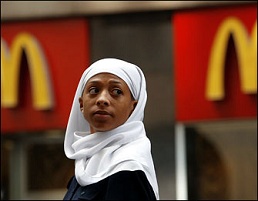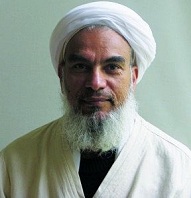American Muslims
Muzaffar Iqbal
Opinion Maker

"All that the American Muslims are able to do in this post-9/11 era is to simply live on the edge and fight for what should already be their right as citizens of a country where the rule of law is supposedly exemplary, where democracy has reached its perfection, as some people claim, where equal opportunities are supposed to be the norm. But one cannot expect this in an era of platitudes, where one incident can lead to a complete reorientation of state policies, and imaginary fears can lead the most powerful military power on earth to spend astronomical amounts of money on erecting a security apparatus that has eroded the notions of freedom and dignity."
The little stuntman from Gainesville, Florida, lived through his limelight of a few days, like the annoying fly which flutters around one’s face before its inevitable disappearance in the dustbin. America has moved on to a post-September 11, 2010 low season, although the next hype may be just around the corner.
Forgotten under the darkness of the limelight focusing on the little pastor are historical realities of American Muslims and their equally historical future. From the sea-farers of the pre-Columbus era to the hordes of African slaves, and from the largely ignored “pure-blooded” Americans to the not-so-pure emigrant community now living under anxieties of a bleak future dawning on them and their progeny in the land of their dreams, the spectrum of American Muslims spans generations just as it spans the extraordinary large range of their spiritual, emotional, psychological, social, and economic states.
Even though there are no accurate statistics of how many Muslims are present in the United States of America, the 2010 estimate of Council on American-Islamic Relations (CAIR), fixing that number at 7 million, is not unreasonable. Numbers are, however, not so important in an era when a pastor tending to a flock of less than 30 souls can grab world attention with a little stunt. What is important, however, is the future of these and new Muslims in the land of honey and flowing rivers where they live side by side with Daniel Pipes, Steven Emersons and Robert Spencers, who can always spin a tale of a growing radical Islamist Wahhabi influence in America and strike massive fears in the heart of American soul now yearning for nothing, waiting for nothing.
As Faulkner, the last of the American novelists who still cared for the soul so rightly pointed out at the Nobel Banquet when he spoke at the City Hall in Stockholm, on December 10, 1950: “Our tragedy today is a general and universal physical fear so long sustained by now that we can even bear it. There are no longer problems of the spirit. There is only the question: When will I be blown up? Because of this, the young man or woman writing today has forgotten the problems of the human heart in conflict with itself which alone can make good writing because only that is worth writing about, worth the agony and the sweat.”
American Muslims now share that universal doom hanging over the American soul, but in a way different from others as they have to bear the additional burden of physical, economic, social and emotional torment spun by American media, which has produced a general suspicion, if not hatred, against Muslims: all Muslims, especially the immigrants, are suspect terrorists until proven otherwise.
In a world characterized by such stark failures as the silence of the so-called international community over the death of innocent men, women, and children in northern Pakistan where drone attacks have now become regular, the inability of the government of Pakistan to even protest against these drone attacks on its own citizens, and the continuous doom hanging over the Palestinians, American Muslims have a moral obligation to protest against these outrageous criminal activities. But the hyper-media has forestalled this pro-active possibility by putting them on the defensive.
All that the American Muslims are able to do in this post-9/11 era is to simply live on the edge and fight for what should already be their right as citizens of a country where the rule of law is supposedly exemplary, where democracy has reached its perfection, as they claim, where equal opportunities are supposed to be the norm. But one cannot expect this in an era of platitudes, where one incident can lead to a complete reorientation of state policies, and imaginary fears can lead the most powerful military power on earth to spend astronomical amounts of money on erecting a security apparatus that has eroded the notions of freedom and dignity. One cannot hope to have any proactive role by a community so terrorized as the Muslims of America to actually stand in front of the White House now occupied by a black man and say: stop those drones now, Mr. Barrack Hussein Obama!
No, that is only possible if American Muslims rise above their full stomachs and redefine their role as citizens of a state where naturalization of fear has killed all hope of justice, liberty, and freedom and where hardly a day passes when someone in the mainstream media does not spin a tale about a distant enemy—Iran, al-Qaeda, Taliban—just about to attack America. Such sensationalism has made words like terrorists, violence, extremists, so commonplace that no one thinks twice about the vague notions associated with these words, but these words deflect attention from the real life realities: enormous amounts of explosive materials being thrown from the skies over hapless populace; existential travail of the men who live in that heart of darkness called Guantánamo Bay, the death and destruction of over one million lives in Iraq, for which no one is assuming responsibility, and the continuous debasement of life in Afghanistan. These real issues have been sacrificed at the American alter for imaginary fears and American Muslims have accomplice in this act of replacement of the real for the imaginary.
There is hardly an organization of American Muslims dedicated to a proactive policy of creating a real niche for this large community. Most of them are merely dealing with existential dilemmas; this is true of mosque committees as it is of those nation-wide Islamic organizations which attract thousands of Muslims to their annual dinners which are increasingly becoming fashion-shows and star-stuck autograph sessions.
___________________________________________________________________________________
Dr. Muzaffar Iqbal is the founder-president of Center for Islam and Science (www.cis-ca.org), Canada, and editor of Islam & Science, a semi-annual journal of Islamic perspectives on science and civilization. He received his Ph.D. in chemistry (University of Saskatchewan, Canada, 1983), and then left the field of experimental science to fully devote himself to study Islam, its spiritual, intellectual and scientific traditions.
Born in Lahore, Pakistan, he has lived in Canada since 1979. He has held academic and research positions at University of Saskatchewan (1979-1984), University of Wisconsin-Madison (1984-85), and McGill University (1986). During 1990-1999, he pursued his research and study on various aspects of Islam in Pakistan, where he also worked as Director, Organization of Islamic Conference (OIC) Committee on Scientific and Technological Cooperation (COMSTECH) between 1991-96 and as Director, Pakistan Academy of Sciences (1998-99).
During 1999-2001, Dr. Iqbal was Program Director (Muslim World) for the Science-Religion Course Program of the Center for Theology and the Natural Sciences (CTNS), Berkeley, USA.
Dr. Iqbal has published books and papers on the relationship between Islam and science, Islam and the West, the contemporary situation of Muslims, and the history of Islamic science.
His publications include Islam and Science, God, Life and the Cosmos: Christian and Islamic Perspectives, Science and Islam, Dawn in Madinah: A Pilgrim’s Passage, The Making of Islamic Science (IBT, 2009) and a few more titles.
He is the General Editor of the forthcoming seven-volume Integrated Encyclopedia of the Qur’an, the first English language reference work on the Qur’an based on fourteen centuries of Muslim reflection and scholarship. He is a regular contributor to Opinion Maker.
___________________________________________________________________________________
URL: http://www.a-w-i-p.com/index.php/2010/09/17/american-muslims

























